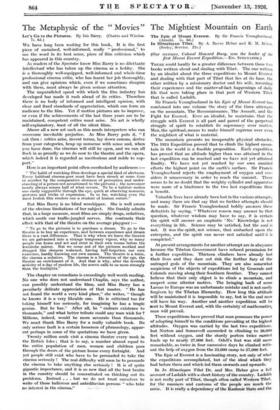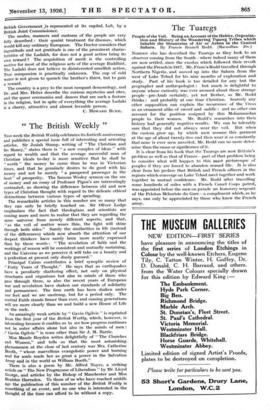The Mightiest Mountain on Earth
The Epic of Mount Everest. By Sir Francis Younghusband, (Arnold. is. 6d.) The Epic of Mount Everest. By Sir Francis Younghusband, (Arnold. is. 6d.) In Himalayan Tibet. By A. Reeve Heber and K. 111. Heber. (Seeley, Service. 21s.) (Our reviewer, Colonel Howard Bury, was the leader of the " first Mount Everest Expedition.—ED. SPECTATOR.) THERE could hardly be a greater difference between these two books written about and dealing with Tibet. The one written by an idealist about the three expeditions to Mount Everest and dealing with that part of Tibet that lies at its base, the other written by a missionary doctor and his wife, recording their experiences and the matter-of-fact happenings of daily life that were taking place in that part of Western Tibet that is called Ladakh.
Sir Francis Younghusband in his Epic of Mount Everest has
condensed into one volume the story of the three attempts on the mountain, The Reconnaissance, The Assault, and the Fight for Everest. Ever an idealist, he maintains that the struggle with Everest is all part and parcel of the perpetual struggle of spirit to establish its supremacy over matter. Man, the spiritual, means to make himself supreme over even the mightiest of what is material.
The mountain presents no insuperable physical obstacles. The 1924 Expedition proved that to climb the highest moun- tain in the world is a feasible proposition. Each expedition has proved that an altitude higher than was attained in the last expedition can be reached and we have not yet attained finality. We have not yet reached by our own unaided efforts the highest point on the earth's surface. Sir Francis Younghusband rejects the employment of oxygen and con- siders it unnecessary in order to reach the summit. There seems to be no doubt that the weighty cylinder and apparatus were more of a hindrance to the two last expeditions than
a benefit.
Valuable lives have already been lost in the various attempts, and many there are that say that no further attempts should
be made. Sir Francis Younghusband boldly answers these defeatists by saying, " Whatever reason may answer to that question, whatever wisdom may have to say, it is certain the spirit will answer an emphatic `No: Knowledge is not everything in life. Science may be satisfied, but the soul is not. It was the spirit, not science, that embarked upon the
enterprise, and the spirit can never rest satisfied until it is completed."
At present arrangements for another attempt are in abeyance because the Tibetan Government have refused permission for a further expedition. Thirteen climbers have already lost their lives and they dare not risk the further fury of the outraged gods of the mountain. They are also somewhat suspicious of the objects of expeditions led by Generals and Colonels moving along their Southern frontier. They cannot believe that their only object is to climb a mountain, and suspect some ulterior motive. The bringing back of some Lamas to Europe was an unfortunate mistake and is not easily forgiven by the Tibetan Hierarchy. How long this attitude will be maintained it is impossible to say, but in the end man will have his way. Another and another expedition will be sent to Mount Everest and, with the certainty of mathematics, man will prevail.
These expeditions have proved that man possesses the power of adapting himself to the conditions prevailing at the highest altitudes. Oxygen was carried by the last two expeditions, but Norton and Somervell succeeded in climbing to 28,000 feet without oxygen, and the sturdy porters twice earned loads up to nearly 27,000 feet. Odell's feat was still more remarkable, as twice in four successive days he climbed with- out the help of oxygen from the 23,000 camp to 27,000 feet.
The Epic of Everest is a fascinating story, not only of what the expeditions accomplished, but of the ideal which they had before them and which led them onwards and upwards.
In In Himalayan Tibet Dr. and Mrs. Heber give a full account of Ladakh with a short history of the country. Ladakh is not really part of Tibet, though often called Western Tibet, for the manners and customs of the people are much the same. It is really a dependency of the Kashmir State and the British Government is represented at its capital, Leh, by a British Joint Commissioner. -- The modes, manners and customs of the people are very fully described : their quaint treatment for diseases, which would kill any ordinary European. The Doctor considers that ingratitude and not gratitude is one of the prominent charac- teristics of the Ladakh, for does not a good action bring its own reward ? The acquisition of merit is the controlling motive for most of the religious acts of the average Buddhist. The Ladaki does not believe in disinterested unselfish action. True compassion is practically unknown. The cup of cold water is not given to quench the brother's thirst, but to gain a reward.
The country is a prey to the most rampant demonology, and Dr. and Mrs. Heber describe the curious mysteries and rites, and the queer ceremonies and dances that are such a feature in the religion, but in spite of everything the average Ladaki is a cheery, attractive and almost loveable person.
C. HOWARD BURY.















































 Previous page
Previous page